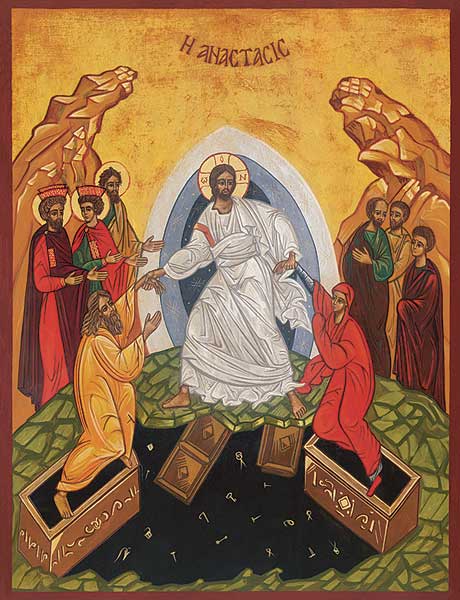The story of Jesus descending into Hell to raise up Adam and Eve does not come from the Bible, although the first letter of Peter (3:18 to 4:6) speaks of his proclamation of the Gospel to those who had died before his coming. The Apostles Creed includes: "He descended into Hell ..." The apocryphal Gospel of Nicodemus, written in the second century, describes the meeting of the Risen Christ with Adam and Eve:
And, behold, suddenly Hades trembled, and the gates of death and the bolts were shattered, and the iron bars were broken and fell to the ground, and everything was laid open. ... Then the Lord Jesus, the Saviour of all, affectionate and most mild, saluting Adam kindly, said to him: "Peace be to thee, Adam, with thy children, through immeasurable ages of ages!" Amen. Then father Adam, falling forward at the feet of the Lord, and being raised erect, kissed His hands, and shed many tears, saying, testifying to all: "Behold. the hands which fashioned me!" And he said to the Lord: "Thou hast come, O King of glory, delivering men, and bringing them into Thy everlasting kingdom." Then also our mother Eve in like manner fell forward at the feet of our Lord, and was raised erect, and kissed His hands, and poured forth tears in abundance, and said, testifying to all: "Behold the hands which made me!"
This dramatic scene communicates the great power of Christs saving action on the cross. The second person of the Trinity entered human history and died to save us from our sins. However, this salvation reaches back in history to save those already dead. This icon depicts The Descent into HellJesus gift of paradise to those who have waited in the abode of the dead before the Paschal Mystery has effected their liberation. Christ is the new Adam who overturns the fault of the father of our race. We also see the righteous Kings David and Solomon in company with John the Baptist: the former representing the just of the Old covenant, the latter that Christ is the True King and the fulfillment of the prophets message. Unlike most iconic portrayals of Jesus, here he is dressed in a white robe rather than in his pre-resurrection red tunic and blue cloak. He is surrounded by an aura of divine light, a mandorla, forever defeating the darkness of death. His halo bears a cross and the Greek letters; omicron, omega, nu; spelling "HO ON"; this in English is becomes "He who is," as in, He who is, who was, and is to come at the end of the ages. Below Christs feet are the broken gates of Hell with shattered lock and key falling into the abyss.
Adam is shown as a very old man, since he lived (according to Genesis 5:5) to the ripe old age of 930! The position of Jesus hand on Adams wrist is a subtle detail reminding us that it is Christs work of redemption that raises fallen Adam, and each one of us, to the new life of Resurrection.
And thank you for the welcome.


